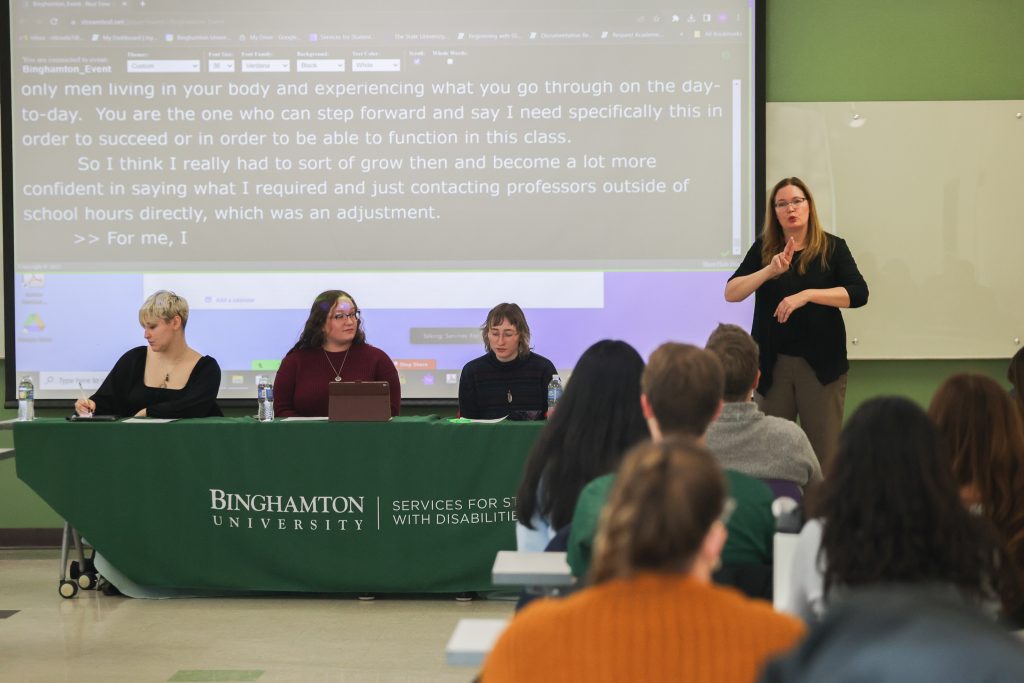This past Wednesday in the Binghamton University Union, a collective of disabled students participated in a panel to discuss their experiences at the University.
Services for Students with Disabilities (SSD) invited three student panelists to share observations about their time at BU and describe how SSD has helped them socially and academically. The event was held as part of a series of events known as “Reframing Disability Week.” Other events included the “Dos and Donuts” of Access QR Codes — which demonstrated QR codes that can be used to report accessible doors that are out of order — and Pop Up Tactile Art Images, which featured 3-D and tactile paintings of the “Mona Lisa” and “The Scream” with lights, braille and audio descriptions.
Cassidy Taylor, the president and co-founder of the Disabled Students Union (DSU), a SUNY disability ambassador and a junior majoring in human development, moderated the panel. She began the event by asking questions and facilitating a Q&A from the audience. Taylor asked the panel questions on topics including how the panelists’ disabilities affected their relationship with education, how their disability affects their life on a day-to-day basis and the misconception of accommodations being an advantage for select students.
Daisy Dimatos, a panelist and a freshman majoring in business administration, described advocating for herself when speaking to professors to ensure her accommodations were met.
“Once you get a disability, you’re the only one living in your body,” Dimatos said. “You’re the only one experiencing what you go through on a day-to-day basis, so you’re the only one who can really step forward and say ‘I need specifically this’ in order to succeed and to be able to function in a class.”
KT Fitzgerald, another panelist and a senior double-majoring in psychology and women, gender and sexuality studies, described how perceptions of success can affect disabled students’ self-esteem.
“I think if there [was] less of an emphasis on success looking like one thing, it could alleviate a lot of shame,” Fitzgerald said. “All around you, you see students who may or may not have a disability and may not need the same amount of accommodations you do, and that makes you feel impostor syndrome and wonder ‘Am I cut out for this?,’ ‘Am I enough to be a student?’ Ultimately, I know that what I’m pursuing is because I’m passionate about it, and I enjoy learning.”
According to a study by the National Center for Education Statistics (NCES), among students who had a disability while attending college, 37 percent informed their institution of their disability. Academic resources like tutoring, office hours or study groups can be helpful for students with disabilities.
Christen Szymanski, the SSD’s director, explained the importance of organizing the student panel and challenging stigmas typically associated with disabilities.
“So often we think of disabilities as a bad thing, or we don’t understand it and so we shy ourselves away from it,” Szymanski said. “This event is to educate yourself, [to] think that disabilities aren’t so bad and to help change your perception. SSD is working on reframing the disability narrative at BU, and we see doing that by sharing experiences.”
The event ended with a final question from Taylor about how faculty, staff and other members of the campus community can support disabled students. Bo Schooley, the third panelist and a sophomore majoring in psychology, responded that people can take the opportunity to learn.
“Everybody’s experiences are different and if you’re not taking the opportunity to learn, you’re not going to learn,” Schooley said. “Then you’re going to live not knowing, and whether it’s on purpose or accidental, make a choice that negatively affects someone with a disability whether it be emotional or physical in terms of accessibility. Taking the time to ask questions in a situation like [this panel] or just sit and listen is so important.”
A 2021 research brief conducted by the National Center for College Students with Disabilities found that, compared to students without disabilities, disabled students were less likely to believe that their campuses were welcoming, safe and secure and were less satisfied with their academic and social experiences. They also reported higher rates of discrimination on campus.
Janmariz Deguia, DSU’s vice president and a sophomore majoring in human development, expressed gratitude to SSD for providing disabled students a platform to share their experiences and feelings.
“[SSD] has helped BU students in terms of their personal and academic success, and we are so grateful for their organizing of this event,” Deguia said. “It’s wonderful that we have this space to connect, but Reframing Disability Week opens this conversation up to the larger BU community which is crucial to be able to take further steps to improve our campus community in terms of accessibility, understanding and unity.”



